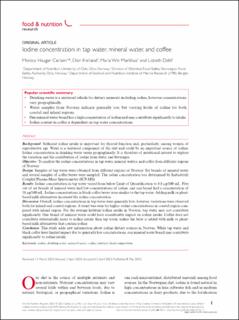| dc.contributor.author | Carlsen, Monica Hauger | |
| dc.contributor.author | Kielland, Ellen | |
| dc.contributor.author | Markhus, Maria Wik | |
| dc.contributor.author | Dahl, Lisbeth | |
| dc.date.accessioned | 2023-11-03T10:40:48Z | |
| dc.date.available | 2023-11-03T10:40:48Z | |
| dc.date.created | 2023-06-14T09:42:00Z | |
| dc.date.issued | 2023 | |
| dc.identifier.citation | Food & Nutrition Research (FNR). 2023, 67 . | |
| dc.identifier.issn | 1654-6628 | |
| dc.identifier.uri | https://hdl.handle.net/11250/3100490 | |
| dc.description.abstract | Sufficient iodine intake is important for thyroid function and, particularly, among women of reproductive age. Water is a universal component of the diet and could be an important source of iodine. Iodine concentration in drinking water varies geographically. It is therefore of nutritional interest to explore the variation and the contribution of iodine from water and beverages. | |
| dc.language.iso | eng | |
| dc.title | Iodine concentration in tap water, mineral water, and coffee | |
| dc.title.alternative | Iodine concentration in tap water, mineral water, and coffee | |
| dc.type | Peer reviewed | |
| dc.type | Journal article | |
| dc.description.version | publishedVersion | |
| dc.source.pagenumber | 0 | |
| dc.source.volume | 67 | |
| dc.source.journal | Food & Nutrition Research (FNR) | |
| dc.identifier.doi | 10.29219/fnr.v67.9517 | |
| dc.identifier.cristin | 2154330 | |
| cristin.ispublished | true | |
| cristin.fulltext | original | |
| cristin.qualitycode | 1 | |
